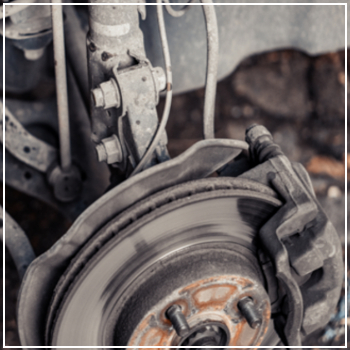While neglecting proper storage could indeed contribute to rust-related issues, a more probable explanation is that you visited a shop that installed aftermarket brakes. These shops might be recommended by your insurance provider because they offer low-cost repairs. However, aftermarket brakes don't just fail early—they pose ongoing risks every time you hit the road. To ensure top-notch repairs while prioritizing customer safety, DaSilva’s Auto Body exclusively uses original equipment manufacturer (OEM) parts. Here's what you need to understand about aftermarket brakes. OEM brakes are crafted from pickled and oiled galvanized steel. Generally, galvanized steel is favored for its ability to withstand environmental factors. The pickling and oiling processes eliminate leftover scale from production, preventing the pads from rusting and failing prematurely. Under current OEM guidelines, galvanized steel undergoes submersion in acid to remove the oxide layer formed during manufacturing. It’s then coated with oil to minimize future oxidation—or at least delay it significantly. This combination enhances adhesion between the brake pad and backing plate, working together with the car’s friction lining and rotors. Inconsistent regulations surrounding brakes have led to aftermarket versions being made from a material known as “black steel.†Named for the black oxide layer left on its surface, black steel—sometimes coated silver to mimic galvanized steel—is problematic for several reasons: No state or federal regulations exist for aftermarket brakes comparable to those for their OEM equivalents. To highlight the dangers of self-regulation among aftermarket vendors, the Global Brake Safety Council conducted three studies comparing black steel brakes to illustrate how drivers face increased risks on the road. The studies revealed that aftermarket brakes exhibit oxide layers linked to poor performance, early rusting, and safety issues. Key findings included: For more information on the differences between OEM and aftermarket parts, and why we opt for OEM parts in all repairs, reach out to our Naugatuck location today to schedule an appointment. Remember, your safety is paramount, and choosing the right parts makes all the difference. Don’t let subpar replacements compromise your peace of mind behind the wheel. Sinopec Chongqing SVW Chemical Co., Ltd. (hereinafter referred to as SVW chemical) is located in Changshou District, Chongqing, formerly known as Sichuan Vinylon plant. It is one of the four major chemical fiber bases built in China in the 1970s. It entered Sinopec as a whole in 1983 and is currently the largest natural gas chemical enterprise in China. The main PVA product is as follow : SVW polyvinyl alcohol 088-05 Sinopec Pva Resin,Pva Polyvinyl Alcohol,Polyvinyl Alcohol Fabric,Polyvinyl Alcohol Film Henan Chuange Industry CO.,LTD , https://www.chuangegroup.com Imagine driving along when suddenly your brakes start making an annoying screeching sound, or worse yet, you find yourself having to push harder than usual just to slow down. It’s a situation that demands immediate attention, so you head to an auto body shop to get things sorted out. You’re told the brakes or rotors need replacing to ensure safe travel. Fast forward less than a year later, and you're facing another bout of brake failure. Could improper storage be to blame, letting rust creep in? Or is there something else going on?
Imagine driving along when suddenly your brakes start making an annoying screeching sound, or worse yet, you find yourself having to push harder than usual just to slow down. It’s a situation that demands immediate attention, so you head to an auto body shop to get things sorted out. You’re told the brakes or rotors need replacing to ensure safe travel. Fast forward less than a year later, and you're facing another bout of brake failure. Could improper storage be to blame, letting rust creep in? Or is there something else going on?What Happens When Aftermarket Brakes Are Installed
How Are Aftermarket Brakes Manufactured?
Standards and Regulations for Aftermarket Brakes
Chuan Wei chemical processing capacity of natural gas is 1 billion 550 million cubic meters / year (including joint venture), the main products include methanol (MeOH), vinyl acetate (VAC), polyvinyl alcohol (PVA), vinyl acetate ethylene copolymer emulsion (VAE), methyl acetate (MeOAc), EVOH, liquid ammonia, vinylon fiber, acetic acid (joint venture), acetic acid (joint venture), etc. The company has obtained iso9001-2015, iso45001-2018, iso14001-2015 and other quality, environment, occupational health and safety system certifications, passed TFs (joint sustainable development) evaluation and review, and its products have been exported to more than 40 countries and regions such as the United States, the European Union and Southeast Asia.
The export volume of PVA products has ranked first in China for many consecutive years. VAE products have obtained the certification of China's environmental labeling products. The production technology of high-strength and high modulus fiber and low-temperature water-soluble fiber is at the forefront of the industry.
SVW polyvinyl alcohol 088-20
SVW polyvinyl alcohol 088-35
SVW polyvinyl alcohol 088-50
SVW polyvinyl alcohol zy-iiv
SVW polyvinyl alcohol 0388
SVW polyvinyl alcohol 098-05
SVW polyvinyl alcohol 098-27
SVW polyvinyl alcohol 171s / 100-27s
SVW polyvinyl alcohol 100-35
SVW polyvinyl alcohol 098-60
SVW polyvinyl alcohol 100-78
SVW polyvinyl alcohol 092-20
SVW polyvinyl alcohol 092-35
SVW polyvinyl alcohol 092-53